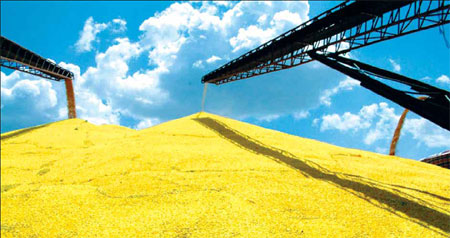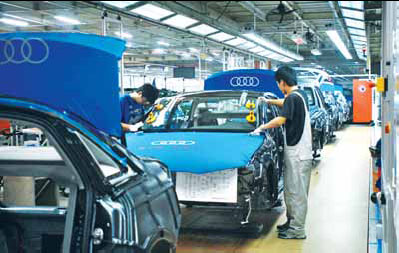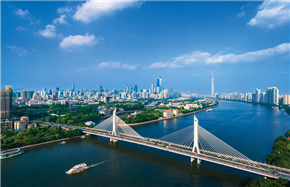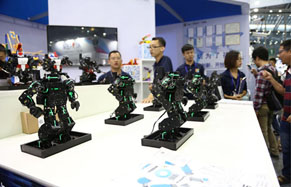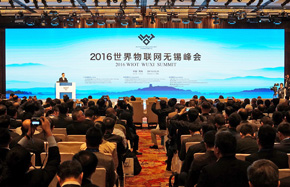Jilin walking road to prosperity
|
Corn heaped in a mound in a facility of the Changchun Dacheng Industry Group. Photos provided to China Daily |
|
Employees work at the production lines in a factory of FAW-Volkswagen Automotive Co Ltd. |

Investments in innovation, infrastructure have led to explosive GDP growth
A Jilin local who has been away from the province for years will find great changes in his home after he comes back. He will lead a life of greater convenience, enjoy more days of blue skies every year and witness his neighbors getting richer.
The province achieved a GDP of 1.05 trillion yuan ($166.5 billion) in the last year, an increase of 13.7 percent over the year previous. It was the first time provincial GDP surpassed 1 trillion yuan.
Grain production reached a record 31.7 million tons in the same year, 3.3 million tons more than in the previous year.
Large-scale industrial enterprises generated a total profit of 112.1 billion yuan, increasing 44.6 percent year on year.
The per capita disposable income of urban residents rose by 15.5 percent to reach nearly 17,800 yuan, and the per capita net income for people in the countryside also grew to more than 7,500 yuan, up 20.4 percent.
The northeastern Chinese province is undergoing great changes because of increased investment, a growing number of industrial projects and preferential policies to promote innovation.
The provincial government is prioritizing upgrades and optimization of the industrial structure while enlarging its scale.
"We want high speed and high quality as well," said Sun Zhengcai, Party chief of the province. "Quality should be the priority."
The government has taken a series of measures over the past two years to boost its economy on a county-by-county basis.
It believes that investment is a key driving force of the economy. In 2011, a total of 744.2 billion yuan was invested in fixed assets, growing more than 30 percent. Thanks to this injection of funding, high-tech sectors and service industries have emerged.
At the same time, the efficiency of large-scale industrial enterprises has been improved, with energy consumption per unit GDP reduced by 4.25 percent. The sulfur dioxide emission and chemical oxygen demand were cut to meet the national standard over the 11th Five-Year Plan (2006-2010).
With a series of encouraging policies, the private economy is also developing quickly in Jilin, with 50.5 percent of the GDP last year contributed by the private sectors.
The government aims to double the province's GDP by 2016. The province also seeks to double the net income of people in urban areas and the countryside by then, Sun said.
Major projects
Jilin has a number of ongoing infrastructure and tourism projects as well as plans for building industrial parks.
The China-Singapore Jilin Food Park was planned in 2008 at the seventh Asia-Europe Meeting. It is the third strategic joint project by the two nations after the Suzhou Industrial Park and the Tianjin Eco-City.
The food park is to be located in Yongji county, which has upgraded its food safety infrastructure through such actions as establishing five roadside animal inspection stations.
With investments totaling 23 billion yuan, the nation's largest tourism project was also started on Baishan Mountain.
Additionally, Changchun, the provincial capital city of Jilin, has attracted many of the Fortune 500 companies, including Toyota, General Motors and Ireland's CRH.
Six highways were completed in the last year, bringing the total length of the province's highways to 2,250 kilometers, half of which was added in the last two years.
The cultural industry has also caught the eye of policymakers. Jishi Media Co Ltd, a cable TV operator based in Jilin, was listed on the Shanghai Stock Exchange in February, marking a milestone for the development of the province's cultural industry.
Innovation, industry
Jilin was one of the nation's earliest industrial bases when the People's Republic of China was founded, but it has lagged behind the coastal regions in recent decades. To revive the province's industry, the government is planning nearly 90 major projects to boost emerging sectors.
The auto industry accounts for about 70 percent of the industrial volume of Changchun, but in recent years, new sectors, such as food processing and train manufacturing, are taking off.
Both the government and companies in Jilin see innovation as a new source of development. In the last year, eight achievements by Jilin companies and research institutes were granted national technical awards.
"If industrialization and urbanization are the two wings of a plane, modern agriculture is the tail," said the provincial Party chief, "without a firm tail, the plane will be off course."
Jilin province has led China in per capita consumption of meat for 12 consecutive years, and the province is also the only one in the nation where per capita grain ownership is more than 1 ton. Six of the top 10 grain producing counties are in Jilin.
zhangzhao@chinadaily.com.cn
(China Daily 05/16/2012 page7)




